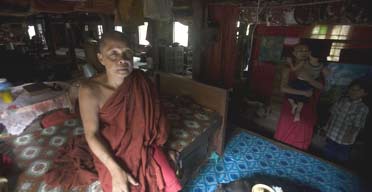
|
|
|
Home Asia Pacific South East Asia Myanmar Myanmar Protest News Little hope of change in MyanmarBy Rene Slama, AFP, Dec 19, 2007
The best hope for Myanmar is to wait for the inevitable transition in leadership Yangon, Myanmar -- Buddhist monks risked their lives to defy Myanmar’s military junta, leading mass protests in a “saffron revolution,” but the lack of progress since suggests little hope of swift reform.
The protests began in anger at an overnight hike in fuel prices on August 15 which left many unable to afford even the bus fare to work. The movement swelled three weeks later after soldiers beat a group of monks in the religious centre of Pakokku and then refused to apologise.
The government’s official toll is 10 dead, including a Japanese journalist, but a UN investigator said 31 had been killed with 74 missing. Amnesty International estimates that of the thousands arrested, 700 remain behind bars along with 1,150 political prisoners already in detention. Many monasteries are now closed or simply stand empty. “The process of change in Myanmar is going to be long, painful and evolutionary. There simply isn’t a silver bullet,” said Zarni, a Myanmar exile and professor at Oxford University who goes by one name. The best hope for Myanmar, he said, is to wait for the inevitable transition in leadership, as the 74-year-old military supremo Than Shwe eventually hands power to a younger clique that could be more open to change. “In the short term, there’s no reason for optimism,” one diplomat said. The flare-up echoed student-led protests in 1988 which were also violently put down, with rights groups saying 3,000 people died in that crackdown. “Many young monks in Yangon went back to their hometowns, and most of them decided not to take their exams because they were afraid of being arrested. It’s so sad,” one abbot told AFP. Authorities have been compiling files identifying the protesters. But laws are applied so arbitrarily that the entire population lives in constant fear of arrest - making it difficult to envisage a new uprising, a UN official said. In the immediate aftermath of the suppression, military trucks scoured the near-deserted streets of Yangon with loudspeakers warning that protesters had been identified and would be arrested. Nearly three months on, despair and resignation weigh down the people, but even the regime has been traumatised by what it did against the monks, who are considered inviolable in mainly Buddhist Myanmar, the UN official said. Hoping to ease international outrage at the violence, the junta has made several diplomatic gestures, allowing UN envoy Ibrahim Gambari to visit the country twice and appointing a liaison who has held three meetings with detained democracy leader Aung San Suu Kyi. Yet the meetings with the Nobel peace prize winner have produced few visible results, and UN Secretary General Ban Ki-moon warned on December 10 that the international community was “running out of patience.” But Myanmar has remained defiant, blocking a briefing by Gambari to a Southeast Asia summit and expelling the UN’s top diplomat in Yangon, Charles Petrie. On December 3, the regime ruled out any role for Aung San Suu Kyi in the process of writing a new constitution. If the United Nations tries to take a tougher stand and bring Myanmar back before the Security Council, close ally China could use its veto to block any international action, as it has in the past. The United States and the European Union have toughened their sanctions against the regime, but so far it has just made the already reclusive generals feel more embattled, said the diplomat. |
 Get your Korean Buddhist News here, brought to you by BTN-Buddhist Channel |
 |
 The Mandala app brings together Buddhist wisdom and meditation techniques with the latest insights of psychology and neuroscience to handle the challenges and complexities of modern life. The App offers a series of engaging talks and conversations with experts on a wide variety of topics, such as managing stress, dealing with adversity, developing greater resilience, cultivating empathy and compassion, creating healthy relationships, and many more. These topics are explored to help find greater peace, meaning and joy in our lives. Our panel of experts include Dr, Thupten Jinpa, Daniel Goleman, Kelly McGonigal and others.FREE DOWNLOAD here |
| Point
your feed reader to this location |
| Submit an Article |
| Write to the Editor |

 No one could have predicted the spectacular demonstrations that unfolded in Yangon and in other towns around the country in September - although the military’s deadly response was depressingly familiar.
No one could have predicted the spectacular demonstrations that unfolded in Yangon and in other towns around the country in September - although the military’s deadly response was depressingly familiar.